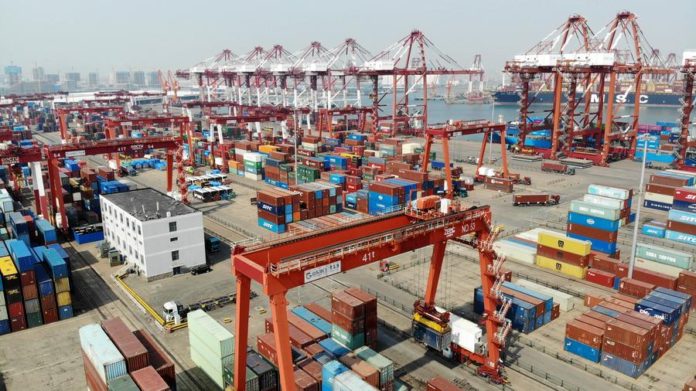
ISLAMABAD (ABC) – Rooted in agriculture, Pakistan’s economy is experiencing a significant shift towards semi-industrialization.
In a discussion with WealthPK, the Ministry of Commerce’s Special Secretary, Ms. Sarah Saeed, highlighted that despite the significance of this shift, Pakistan is grappling with issues like growth driven by imports and a vulnerable external sector.
She also stressed the urgent need to focus on growth fueled by exports.
She argued that the time of depending on subsidized imports is fading, noting the unsustainability of such practices.
Nonetheless, she recognized that efforts to boost exports are confronted with several obstacles, including low productivity, rising business costs, and international protectionist policies.
Recent data from the State Bank depicts a bleak scenario for economic activity, with a sharp decline in private sector borrowing due to steep credit costs and currency volatility.
The threat of a debt crisis is becoming more apparent as policymakers give precedence to short-term stability over sustained growth.
As per the government’s newly released terms of reference, the Economic Coordination Committee (ECC) is responsible for monitoring the monetary and credit landscape.
Its duties involve devising recommendations to manage credit effectively, thereby enhancing production and exports while controlling inflation.
Speaking with WealthPK, esteemed economist Dr. Ashfaque Hasan Khan warned against favoring microeconomic stability at the cost of progress.
He suggested that lowering policy rates could offer significant relief, potentially saving billions in annual interest expenses.
The historical context of Pakistan’s economic policies is being examined, with critics indicating a move away from development strategies centered on the populace towards technocratic measures.
This shift, along with the absence of visionary political leadership, has led to widespread disenchantment with the current economic situation.
Conversing with WealthPK, the Ministry of Planning, Development, and Special Initiatives’ Chief Economist, Ahmed Mustajab Karamat, pointed out that with the prospect of another IMF bailout for Pakistan, there are increasing doubts about the efficacy of past agreements.
Persistent concerns about the IMF’s one-size-fits-all approach have led to calls for tailored strategies to address Pakistan’s unique challenges.
Mustajab remarked, “With the growing appeals for external assistance, there’s an escalating advocacy for homegrown economic solutions.
The need to harness local resources and expertise to reduce dependence on foreign aid is more critical than ever.”
Confronted with impending debt and uncertainty, Pakistan stands at a pivotal juncture: to continue the cycle of bailouts or to carve a route towards sustainable growth. The future will unveil the country’s choice and its consequences.
